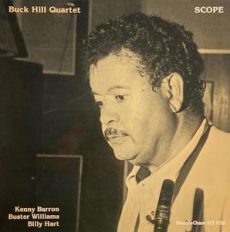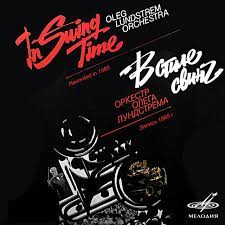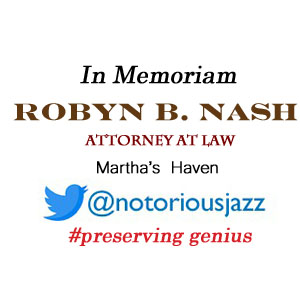
Requisites
Scope ~ Buck Hill Quartet | By Eddie Carter
This week’s choice from the library is from Buck Hill, the wailing mailman from Washington, D.C. He delivered mail during the day and performed at night in the city’s jazz clubs. The Buck Hill Quartet enters the spotlight of this discussion with Scope (SteepleChase Records SCS-1123). It was his second album as a leader, and the follow-up to This Is Buck Hill, his debut from a year earlier. Buck’s capabilities as a composer are also on display as the tenor saxophonist wrote all the tunes. His bandmates again are Kenny Barron on piano, Buster Williams on bass, and Billy Hart on drums. My copy is the original 1979 Danish Stereo pressing.
Side One starts at a speedy clip with the title tune, Scope. Buck and company begin the melody quickly; then, the saxophonist flies out of the gate in a rapid opening solo. Kenny follows with an electrically charged reading while Buster and Billy propel them toward a brisk climax. Ballad Repeter slows the tempo down for the foursome’s tender theme, which is repeated with melodic beauty. Barron takes the lead with a delicately pretty reading that’s beautifully structured. Hill continues this serene sequence with warmth and sensitivity in the following interpretation, matched by the charming compliment of Williams and Hart into the saxophonist’s passionately elegant reprise and ending.
Blue Bossa, a Latin-flavored original, ends the first side on an upbeat note and grabs the listener from the start of the quartet’s infectious melody. Buck kicks off the solos with a festive presentation, then Kenny provides a happy showcase on the subsequent reading ahead of the closing chorus. Side Two gets underway with Beast Beautiful. It’s taken at a lively pace, and the saxophonist steps up first to give an energetic performance. Barron meets the challenge in the following interpretation with a youthful spirit and feeling. Williams significantly contributes to the final reading preceding the song’s abrupt climax.
The Sad Ones is a gorgeous ballad with a haunting poignancy in Buck’s delivery of the melody. The opening solo by Buck is a stunning showcase of warmth and tenderness that beautifully illustrates his creativity as a ballad composer. Kenny compliments the saxophonist with an emotionally moving presentation sustained by Buster and Billy’s gentle accompaniment into Buck’s delicate finale. Funk Dumplin’ is a blues that comes to life with the ensemble’s brisk theme. Hill starts the opening solo with a spicy flavor, then Barron spreads his wings in the following reading. Williams takes an exhilarating walk next, and Hart delivers a fascinating finale leading to the ensemble’s exit.
Nils Winther produced Scope, Elvin Campbell recorded the album, and Freddy Hansson was the mixing engineer. The sound quality is so good the listener will think they’re in the studio as the musicians are recording. The soundstage is stunning, and the record is silent until the music starts. If you’re a fan of Buck Hill or enjoy the tenor sax, I happily recommend and invite you to check out Scope by The Buck Hill Quartet on your next vinyl excursion. It’s an excellent album that will appeal to any novice or seasoned jazz fan and whet their appetite to hear more by the wailing mailman from Washington, D.C.
~ This Is Buck Hill (Steeplechase Records SCS 1095) – Source: Discogs.com © 2023 by Edward Thomas Carter
More Posts: choice,classic,collectible,collector,history,instrumental,jazz,music,saxophone

Daily Dose Of Jazz…
Oleg Leonidovich Lundstrem was born April 2, 1916 into a family of musicians in Chita, Transbaikal Oblast. His family moved to Harbin, China when he was five. By 1935, inspired by Duke Ellington’s Dear Old Southland record which he purchased, he joined forces with eight other young Russian amateur musicians and formed the Oleg Lundstrem Orchestra. The following year the band moved to Shanghai, China where they immediately became popular among the public. The band was an important part of Shanghai’s jazz scene until 1947, along with Buck Clayton Orchestra.
After World War II, in 1947 Oleg returned to the Soviet Union and settled in Kazan, where he worked as a violinist in the opera and ballet theatre, while keeping his jazz orchestra as a side act. 1956 saw the Oleg Lundstrem Orchestra moving to Moscow where he was appointed by the Soviet cultural authorities as the orchestra’s art director and conductor.
His orchestra was recognized by the Guinness Book of Records as the oldest continuously existing jazz band in the world, the official name being The State Oleg Lundstrem Chamber Orchestra of Jazz Music.
Composer and conductor Oleg Lundstrem, also spelled Lundstroem or Lundström, transitioned from natural causes at his home on October 14, 2005 in Korolyov, Moscow Oblast at the age of 89.
More Posts: bandleader,composer,conductor,history,instrumental,jazz,music,violin

Daily Dose Of Jazz…
Alan Haven was born Alan Halpern on April 1, 1935 in Prestwich, Lancashire, United Kingdom. His early work was performed on a Lowrey organ. He collaborated with John Barry on two Bond movies ~ From Russia With Love and Dr. No, and Barry wrote an extended jazz organ solo for his Oscar-winning theme from The Lion in Winter and recorded it as a single.
He released several albums in the 1960s and 1970s, initially on Fontana Records, CBS Records including a recording of a live set at Ronnie Scott’s in London, England. He released Live at Annie’s Room and Mastersound, remastered and re-released three of Alan’s previous albums Organ Show, Images and Collector’s Item.
Local musicians, including Eric Delaney, organized a big band night featuring Alan. With his wife Karen they produced four albums which were Two, Day By Day, Libra and By The Seaside, which was released in 1992.
Organist Alan Haven transitioned on January 7, 2016.
More Posts: bandleader,history,instrumental,jazz,music,organ



